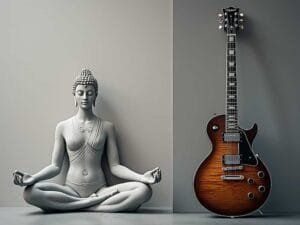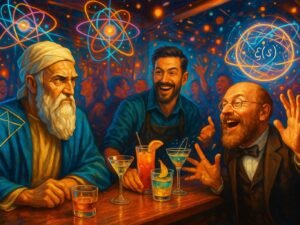“What’s your thing, Marcel?”
“Building a bridge between nonduality and rationality.”
“Wait—spirituality and reason? Aren’t they opposites? That’s a bit odd.”
“It seems that way at first. But after nondual realization, it turns out they’d always been on the same side.”
Without nonduality, reason spirals into abstraction.
Without reason, nonduality drifts into dogma.
Together, they illuminate a path that’s both grounded and free.
Table of contents
Why, of all things, approach nonduality with thought?
It’s safe to say that I’m a left-brain personality: The world inside and outside of me unfolds in a fierce whirlpool of thoughts. Fortunately, thinking feels like a blessing, though I know it can also be a curse. What keeps me balanced—still in touch with intuition and feelings—is nondual recognition.
My own nondual realization came in 2016: a profound coming home. There, at home in Brahman, a dream was born: what if nondual wisdom reconciled with rational thought? The world smiled kindly, but said it couldn’t be done. That’s when the dream became a passion. After all, what’s more fun than doing the impossible?
Passion, in this sense, is not at odds with nondual recognition. There is a difference between desire that clings and passion that gives. Toxic desire grasps at outcomes, ego. But passion for truth is more like love: it flowers naturally, without demand, without fear of loss. When passion is rooted in realization, it feels light, playful, even joyful. It moves you forward without pushing, and what it seeks, it already shares.
And wouldn’t it be ironic if nondual philosophy failed to bridge the East-West divide? What would that say about its accuracy? Of course, each of us still have to cross the bridge alone to awaken: Brahman, in all its guises, remains ineffable, so you must see it for yourself.
Keeping the path clear
That same ineffability blurs the line between true realization and clever talk—though you cannot fool someone who has truly recognized Brahman. The perennial philosophy, for that reason, is expressed in countless tongues, not all of them sincere. Heraclitus already lamented, two-and-a-half millennia ago:
“Though wisdom is common, the many live as if they have wisdom of their own.”
We are experts at reinventing the wheel—and forgetting it again. A well-founded bridge could make this eternal reinvention less cumbersome and passing the gateless gate to the clarity of nondual presence more likely and common—especially in the West with its dualistic legacy.
Without reason, nonduality has a way of drifting back into dogma. The human reflex to objectify is strong: we keep minting new words for the same ineffable truth, turning each phrase into a doctrine, only to discover once more that the truth cannot be captured in concepts. This cycle—naming, codifying, and disillusionment—repeats endlessly across traditions and generations.
Reason, when it stays grounded, can interrupt that wheel-spinning. It never claims to capture the ineffable, but it reminds us not to mistake words for what they point to. Unlike doctrine or clever talk, reason is not just another vocabulary but a coherent system, tested against itself, that can distinguish clarity from confusion.
At the same time, reason also works as a kind of Rosetta Stone: a cross-cultural language of logic and coherence. It makes dialogue possible across traditions, safeguarding clarity where slogans would otherwise divide. In this way, reason keeps the bridge open and uncluttered, so the path to nondual recognition is less obstructed by the ruins of yesterday’s dogmas.
Where nonduality finds its voice in reason

Reconciling nondual wisdom with love of reason not only affirms the immeasurable value of nondual recognition in the West, but also opens a new, direct path to its doorstep through rational philosophy, without recourse to the supernatural.
Rational Nondualism is what I call my ongoing project, and it avoids insider jargon. It trades buzzwords for plain language and clean, usable definitions. Not to domesticate the mystery, but to remove the fog. My books focus on the limits of knowing, clarify what we actually mean by words like samsara and nirvana, and apply those terms consistently. When a concept drifts into vagueness, we refine it; when a claim inflates into hand-waving, we pare it back to what can be lived, tested, and held to the standards of coherence.
The result is a bridge that stays walkable in both directions—from lived recognition to clear thought, and from clear thought back to recognition—so awakening can travel beyond the spiritual bubble into ordinary life, conversation, and even science. That’s why Rational Nondualism sees linguistic precision not as a sign of “not getting it” but as kindness.
One common price of awakening (it’s not all fun, you know) is that it gets a little quiet: You long to meet more people on the nondual side. Ontologically we are all in Brahman, but psychologically, only few recognize it. Perhaps that’s why gurus welcome students. I’m no guru, only a student—and a writer since 2016.
And every word I write serves the same aim—for no other reason than itself: to bring Eastern and Western thought a little closer so that more people can recognize and live their nonduality. Rational Nondualism isn’t a comparison exercise but a synthesis: a bridge that asks for time, patience, and steady work. I’m building it piece by piece … and there’s much more on the way.
You can support Marcel’s work, find gifts, and boost your style at Marcel’s Booktique.
His books—in paper, pixel, and audio—can also be found at Amazon and other select retailers.
Looking for mindful & funny spiritual gifts, gear, deco, or gadgets? Why not check out the affordable Amazon Merch custom designs by Simply Nondual!
Share this article:




